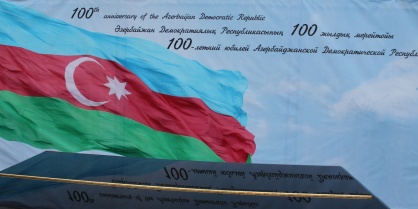
Celebrating the Azerbaijan Democratic Republic: Legacy of Democracy and Conflict
Publication: Eurasia Daily Monitor Volume: 15 Issue: 80
By:

On May 28, Azerbaijan celebrates the 100th anniversary of the founding of the Azerbaijan Democratic Republic (ADR)—the first democratic state with a parliamentary form of government in the Muslim World. Baku has launched a worldwide campaign to mark the centenary in an effort to attract international attention to Azerbaijan, its long-standing secular tradition and modern society, and the unresolved conflict in Karabakh (Azernews.az, April 6, 2018).
The First Republic, as it is often referred to domestically, survived for only 23 months, before Moscow took control of Azerbaijan and subsequently incorporated it into the Soviet Union as one its constituent republics. Despite its short existence, the legacy of this concerted national attempt at sovereignty and democratic governance remained a cornerstone of contemporary Azerbaijan and a critical factor in the formation of Azerbaijani national identity. Namely, the concept of secularism enshrined in the First Republic continues to be an uncontested principle of every government since Azerbaijan regained independence from the Soviet Union in 1991.
One of the most remarkable legislative acts passed by the ADR’s parliament was an election law based on universal suffrage—thus, giving women the right to vote in elections before many Western European countries and the United States did. The law allowed all political parties to compete in elections and gain proportional representation in parliament. The rich and diverse political culture at the time was reflected in the inclusive nature of parliament that comprised all major political groups as well as representatives of local minorities—Armenians and Russians.
However, the First Republic did not exist in a vacuum; both Turkey and Russia, fighting on opposite sides during World War One, contested the region while emerging from their own imperial past. Moreover, independence for Azerbaijan and its neighbors, Georgia and Armenia, was accompanied by ethnic tensions, contested territories, and a constant state of conflict—which they tried to resolve by gaining formal recognition from European powers. While the South Caucasus states failed to achieve this recognition at the Paris Peace Conference, the Allies extended de facto recognition to Azerbaijan in the last moment before Bolshevik forces overran the South Caucasus: specifically, in 1918, Azerbaijan was granted jurisdiction over Nagorno-Karabakh by the British military governor of Baku.
This legacy of territorial conflict persisted largely under the surface for the next century, eventually—amidst the collapse and break-up of the Soviet Union—spilling out into the open in the war between Armenia and Azerbaijan over Nagorno-Karabakh and adjacent Azerbaijani territories in the early 1990s. As Azerbaijan celebrates the anniversary of its first independent state at home and around the world, the Karabakh conflict is entering a dangerous stage. The new government in Armenia, established through public protests against Yerevan’s political establishment, has heightened the level of uncertainty (see EDM, May 10, 15). Azerbaijan has protested the visit of the new Armenian Prime Minister Nikol Pashinyan to Karabakh as an illegal act. The Azerbaijani delegation will raise its concerns during the July 7–11 Parliamentary Assembly (PA) session of the Organization for Security and Cooperation in Europe (OSCE), in Berlin, according to OSCE PA Vice President Azay Guliyev (News.az, May 23).
Pashinyan also discussed the settlement of the Karabakh conflict with Russian President Vladimir Putin during his visit to Sochi, on May 14, causing anxiety in Baku about the nature of any potential agreement between Armenia and Russia (News.az, May 14). Furthermore, the recent statement by the Armenian foreign ministry spokesperson, Tigran Balayan, that “Azerbaijan should realize that sustainable peace cannot be achieved without direct participation of Nagorno-Karabakh,” raised even more concerns in Baku. According to commentaries in the Azerbaijani press, if Armenia insists on the inclusion of the Karabakh Armenians in the negotiations, then the displaced Karabakh Azerbaijanis should also participate as they are both interested parties, according to the OSCE Minsk Group–adopted “Baker’s rules” (News.az, May 22).
Uneasiness over the Karabakh peace process is escalating just as internally displaced Azerbaijanis have started returning to areas that were held by Armenia until April 2016, when Azerbaijani troops dislodged Armenian forces in the so-called “four-day war.” About 20 square kilometers of territory returned to Azerbaijani government control, and the construction of new homes and other buildings started immediately (Al Jazeera.com, May 23). This new development is a stark contrast to the desolation evident in Karabakh and seven Azerbaijani districts occupied by Armenian forces since major fighting diminished in 1994.
The 100th anniversary of the Azerbaijan Democratic Republic succeeded in attracting significant international attention, including a statement by United States President Donald Trump that underscored the beneficial cooperation between Baku and Washington in counter-terrorism and energy development. “The coming months bring opportunities to resolve the Nagorno-Karabakh conflict, which would create even more possibilities for US-Azerbaijani cooperation,” President Trump said in a letter to Azerbaijan’s President Ilham Aliyev, adding that the United States looks forward to working with Azerbaijan within the OSCE Minsk Group (Azertag.az, May 24).



